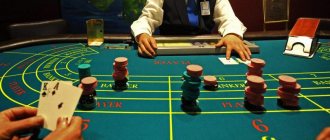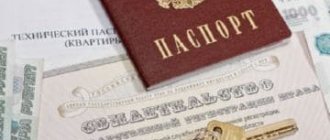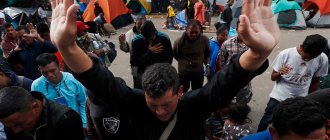Responsibility for this crime is provided for in Article 171.2 of the Criminal Code:
Article 171.2. Illegal organization and conduct of gambling
1. Illegal organization and (or) conduct of gambling using gaming equipment outside the gambling zone, or using information and telecommunication networks, including the Internet, as well as communications, including mobile communications, or without receiving the established procedure for permission to carry out activities related to the organization and conduct of gambling in the gambling zone –
shall be punishable by a fine in the amount of up to five hundred thousand rubles, or in the amount of the wages or other income of the convicted person for a period of up to three years, or by compulsory labor for a term of one hundred eighty to two hundred and forty hours, or by restriction of liberty for a term of up to four years, or by imprisonment for a term of up to two years.
2. The same acts:
a) committed by a group of persons by prior conspiracy;
b) associated with the extraction of income on a large scale, –
shall be punishable by a fine in the amount of up to one million rubles or in the amount of the wages or other income of the convicted person for a period of up to five years, or by imprisonment for a term of up to four years with a fine in the amount of up to five hundred thousand rubles or in the amount of the wages or other income of the convicted person for a period of up to three years or without it.
3. Acts provided for in parts one or two of this article, if they:
a) committed by an organized group;
b) are associated with the extraction of income on a particularly large scale;
c) committed by a person using his official position, –
shall be punishable by a fine in the amount of up to one million five hundred thousand rubles or in the amount of the wages or other income of the convicted person for a period of up to five years, or by imprisonment for a term of up to six years with a fine in the amount of up to one million rubles or in the amount of the wages or other income of the convicted person for a period of up to five years or without it and with deprivation of the right to hold certain positions or engage in certain activities for a period of up to five years or without it.
Features of initiating a criminal case and investigation
Preliminary investigations into cases of illegal organization and conduct of gambling are conducted by investigators of the Investigative Committee. During the investigation, the investigator needs to prove that the crime was committed using gaming equipment outside the gambling zone or on telecommunications networks (including the Internet).
A gambling zone is a part of the territory of the Russian Federation, which is intended for carrying out activities for the organization and conduct of gambling and the boundaries of which are established in accordance with Federal Law of December 29, 2006 No. 244-FZ (Clause 7, Part 1, Article 4 of the said Federal Law) .
Today, the territory of the Russian Federation provides for the creation of gambling zones located in the Republic of Crimea, Altai, Krasnodar, Primorsky Territories and the Kaliningrad Region. The existing gambling zones are Azov City in the Krasnodar Territory and Siberian Coin in the Altai Territory.
Gaming equipment is devices or devices used for gambling (clause 16, part 1, article 4 of Federal Law No. 244-FZ). These are, in particular, slot machines and gaming tables.
The use of gaming equipment is punishable. Actions such as acquisition, storage, transportation, purchase and sale of equipment are not crimes.
Investigators will also need to find out whether you were issued a permit to carry out activities to organize and conduct gambling in the gambling zone. Such permission is issued by the gambling zone management body in accordance with the legislation of the constituent entity of the Russian Federation. It can only be issued to a legal entity registered in the Russian Federation and meeting the requirements specified in Article 6 of Federal Law No. 244-FZ.
Criminal liability for illegal gambling activities
Since 2009, Russia has introduced a ban on gambling activities outside special zones. Two years later, the Criminal Code was supplemented with Article 171.2, which provides for liability for illegal organization and conduct of gambling. How is the mechanism for bringing to justice for such crimes implemented in practice?
The state in the fight against gambling
The history of restrictive measures regarding gambling in our country goes back to the Middle Ages. The original initiator of such measures was the church.
Since the 16th century, a system of gambling regulation has been established to replenish the treasury. Participation in gambling and even being present during it is punishable.
Under the first tsar from the Romanov dynasty, Mikhail, a new procedure for taxation and “payoffs” for gambling was introduced, which is a system in which gambling (dice, cards, etc.) is allowed with the permission of local authorities at rates set by them.
At the same time, gambling is condemned by the authorities, and its illegal conduct is severely punished. In the 17th century, the state balanced between prohibitive measures and fiscal interests. It's not hard to guess where the scales are tipped.
Since the 18th century, gambling appeared at the state court and became widespread among high society. Punishments continue to be applied to ordinary people: from fines to imprisonment.
The passion for gambling is gradually penetrating into all segments of the population and acquiring incredible proportions, despite the continuation of the policy of tightening measures against gambling.
After the revolution, cards remained one of the most popular games among the people. Under the Soviet regime, nothing could be done about gambling either - it became an integral part of people’s lives.
During “perestroika,” gambling reached a new level: in the late 80s, slot machines and the first casinos began to appear, first in elite hotels for foreign tourists.
The gaming industry reached its peak by 2006, when thousands of “one-armed bandits” and gaming tables operated in the country, and the number of issued gambling licenses exceeded 6 thousand. Until 2006, this branch of the entertainment industry was regulated by Chapter 29 of the Tax Code and legislation on licensing of certain types of activities.
With the adoption of Federal Law No. 244 of December 29, 2006 “On state regulation of activities related to the organization and conduct of gambling and on amendments to certain legislative acts of the Russian Federation” (hereinafter referred to as Federal Law No. 244), the time has come for strict legislative regulation of this area.
A ban has been introduced on gambling activities using gaming equipment and information and telecommunication networks, including the Internet and communications.
Since 2009, gambling activities, with the exception of bookmakers and sweepstakes, can only be carried out in four specially organized gambling zones in the Altai, Krasnodar and Primorsky territories, as well as in the Kaliningrad region. Later the Republic of Crimea was added to them.
In 2011, the Criminal Code was amended with Article 171.2, according to which it was recognized as a crime to organize or conduct gambling using gaming equipment outside the gambling zone, or using information and telecommunication networks, including the Internet, associated with the extraction of income in a large scale. size.
It is expected that the illegal gambling business continued to exist, choosing more sophisticated forms. Such activities continued to be carried out in secret in closed clubs, under the guise of bookmakers, Internet cafes, and through Internet sites registered in other countries.
What is a game?
According to Art. 4 Federal Law No. 244 gambling is a risk-based agreement to win, concluded by two or more participants in such an agreement between themselves or with the organizer of the gambling game according to the rules established by the organizer of the gambling game.
In accordance with Art. 5 of this law, activities related to organizing and conducting gambling can be carried out exclusively by gambling organizers exclusively in gambling establishments located within gambling zones. According to Part 1 of Art. 6 organizers of gambling can only be legal entities registered in accordance with the established procedure on the territory of the Russian Federation.
In recent years, illegal gambling activities have most often been carried out through computer variations of a slot machine - a slot machine that gives a chance to win an amount many times greater than the bet. The goal of the game is to collect a winning combination of symbols by spinning the reels. The better the combination, the greater the winnings.
In most cases, physical slot machines are computer-based, and combinations are generated using a random number generator. The same system is used in online slots.
But in practice you can also find live games - roulette or poker in closed clubs.
Since its introduction in 2011, the disposition of Art. 171.2 of the Criminal Code has changed and become more cumbersome: now it is considered a crime to organize and (or) conduct gambling using gaming equipment outside the gambling zone, or without a license obtained in the prescribed manner to carry out activities for organizing and conducting gambling in bookmakers and sweepstakes outside the gambling zone zone, either without permission obtained in the prescribed manner to carry out activities related to organizing and conducting gambling in the gambling zone, or using information and telecommunication networks, including the Internet, or communications, including mobile communications, with the exception of cases of acceptance of interactive bets by organizers of gambling in bookmakers and (or) totalizators, as well as the systematic provision of premises for illegal organization and (or) conduct of gambling.
The qualifying criteria are the commission of a crime by a group of persons by prior conspiracy or an organized group, the use of official position and the extraction of income on a large scale (over one and a half million rubles) or especially large amounts (over 6 million rubles).
The most severe sanction is imprisonment for up to six years with a fine.
In many cases, the commission of a crime involves a violation of the rights of the authors of computer programs, and therefore is additionally qualified under Art. 146 of the Criminal Code. The Austrian software developer most often found as a victim in criminal cases is .
Considering that illegal gambling activity is aimed at making profit and its size directly depends on the number of gambling establishments (terminals) and the persons involved, it is often characterized by a high degree of organization, a pre-developed plan of criminal activity, distribution of functions between participants, and the use of various technical means and tricks when committing and concealing one’s criminal activities, including with the help of involved law enforcement officers, in connection with which it is often qualified under Art. 210 of the Criminal Code (organization of a criminal community or participation in it).
In the general array of crimes, illegal gambling activity is far from being in first place, but, for example, for the capital’s law enforcement officers, cases of this category are no longer something unique with a vague prospect of investigation: on average, about 50 criminal cases are sent to the courts per year.
Some criminal cases differ in the scale of the episodes of criminal activity identified and the number of persons brought to justice. For example, currently the Commander-in-Chief of the Investigative Committee for Moscow is investigating a criminal case regarding the organization of illegal gambling activities using slot machines, poker tables and other gaming equipment in more than 10 secret gambling clubs, in which over 60 persons are accused.
Crime detection and investigation
The identification of crimes of this category is primarily carried out by the departments of the Economic Security Bureau and the PC, and less often by other departments of the internal affairs bodies and the FSB.
The very discovery of a gambling hall and the initiation of a criminal case can be extremely elementary: during the investigation or inspection of the crime scene, investigators seize equipment, conduct an examination of it, interview administrators, security guards and other persons, after which they forward the materials to the bodies of the Investigative Committee, whose competence is the investigation. this category of cases.
With this approach, operational search activities and investigative actions are reduced only to the seizure of gaming equipment and the questioning of persons who were in the establishment, which subsequently entails the difficulty of establishing both the event of a crime and bringing the organizers to criminal liability.
Identification of secret schemes of illegal gambling activities requires competent implementation of operational-search measures to record what is happening on the premises: the distribution of roles among accomplices in security, receiving funds, issuing rewards, etc. Naturally, it is necessary to record and seize gaming equipment and establish an algorithm for its operation. Inspections of premises may be preceded by other operational investigative activities: surveillance, wiretapping, test purchases, and others.
Of course, operatives are interested in identifying and bringing to justice not only the staff of gambling halls, but also the organizers of criminal activities and other accomplices.
The organizers of illegal gambling activities themselves, as a rule, distance themselves from the direct perpetrators and the gambling establishments themselves. Their participation can only be proven through long and carefully planned operational work aimed at establishing the circumstances of organizing an illegal business, renting premises, creating and administering Internet sites, assembling gaming terminals and installing software on them, organizing the process of distributing criminal income, as well as financing criminal activities. activities.
After the activities are carried out, the materials of the operational-search activities are sent to the investigative authorities.
The minimum investigative work to obtain the evidence base consists of examining the seized equipment, cash, documents, as well as media provided by operatives with the results of operational search activities, interrogations of gambling establishment employees (cashiers, security guards, administrators) and other persons (visitors, premises owners) .
Of particular importance in this category of cases is computer-technical forensic examination to establish the presence on the seized equipment of software intended for organizing the gaming process with the receipt of monetary winnings, its algorithm, as well as statistical data (the amount of monetary units entered into the device, the period of the games and etc.). The objects of research are usually slot machines, boards, terminals, and hard drives.
Despite the position of a number of representatives of internal affairs bodies and the Investigative Committee, who believe that in order to initiate a criminal case and send it to court, an examination to determine whether the equipment is considered gaming equipment is not mandatory, judicial practice takes a different path.
At the same time, investigators are faced with the problem of conducting a computer-technical examination of the seized equipment in a state expert institution.
Thus, the divisions of the ECC of the Ministry of Internal Affairs of Russia do not conduct examinations of equipment operating using the Internet (in a dynamic environment), citing the lack of necessary funds. At the same time, such equipment is owned by private non-profit expert institutions, the help of which investigators try to resort to only as a last resort due to the possible controversy of their conclusions.
Fresh practice
Just the other day, the Moscow prosecutor’s office approved an indictment in a criminal case against 25 people accused of organizing and conducting illegal gambling activities.
The prosecution believes that, under the cover of a license to carry out bookmaking activities, an organized criminal group from among the employees of a large bookmaker operated.
At betting points, visitors were given the opportunity to take part in gambling, which was hidden under the “Guess Where the Ball” program, the essence of which was to guess the line or several lines in which the cartoon pictures would coincide after spinning the game reels. The appearance of the game, its purpose and essence are similar to gambling on a slot machine, and a soccer ball moved chaotically on top of these pictures. At the same time, the technical component of the gaming machine was a system unit in which there was no storage device, and the game itself was downloaded via the Internet. The server from which the gambling games were downloaded was located on the territory of a foreign country.
5 organizers were brought to criminal responsibility and charged with 14 counts of criminal activity, including the general director of the organization and 4 technical employees who developed and maintained the gambling program. According to investigators, the criminal group also included the manager of the gaming hall and 19 performers - slot machine operators.
At the same time, the defense side has taken the position of providing betting services (the organization has the appropriate license), and all bets on the equipment available to the organization are possible only on real international sporting events. In this case, statistical information about the results of the games was obtained from a foreign company with which there is a corresponding agreement.
What about the legitimate bookmaking business?
Legal bookmakers are also under constant scrutiny. The interest of tax and law enforcement agencies in such activities is understandable - the bookmaking business is on everyone’s lips due to the abundance of advertising and is associated with huge incomes “on the verge of a foul.”
At the same time, bookmakers may face obstruction of their activities through regular visits by inspectors, inspections, seizure of equipment and documents, and other manifestations of attention, including the replacement of seized equipment with gaming equipment, the use of “their” experts, and banal extortion. Unfortunately, the use of criminal legal instruments to eliminate competitors or for the selfish interests of unscrupulous law enforcement officials is not uncommon.
The industry itself has become strictly regulated by law, and the organizers of the bookmaking business face the risk of criminal prosecution for creating a criminal community and illegal gambling. At the same time, over the past 10 years, operatives and investigators have developed sufficient practice in identifying and investigating crimes related to the illegal organization and conduct of gambling, and the corresponding article of the criminal law has become actually working.
Responsibility for organizing gambling
Illegal organization and conduct of gambling (Part 1 of Article 171.2 of the Criminal Code of the Russian Federation) is punishable by:
- a fine in the amount of up to 500,000 rubles or in the amount of wages or other income of the convicted person for a period of up to three years;
- compulsory work for a period of 180 to 240 hours;
- restriction of liberty for a term of up to four years;
- imprisonment for a term of up to two years.
If a crime is committed by a group of persons by prior conspiracy or is associated with the extraction of income on a large scale (from 1,500,000 rubles), then it is punishable:
- a fine in the amount of up to 1,000,000 rubles or in the amount of wages or other income of the convicted person for a period of up to five years;
- imprisonment for a term of up to four years with a fine in the amount of up to 500,000 rubles or in the amount of wages or other income of the convicted person for a period of up to three years, or without a fine.
If the crime is committed by an organized group, involves the extraction of income on a particularly large scale (6,000,000 rubles) or is committed by a person using his official position, the punishment will be even more severe:
- a fine in the amount of up to 1,500,000 rubles or in the amount of wages or other income of the convicted person for a period of up to five years;
- imprisonment for a term of up to six years with a fine in the amount of up to 1,000,000 rubles or in the amount of wages or other income of the convicted person for a period of up to five years or without a fine, and with deprivation of the right to hold certain positions or engage in certain activities for a period of up to five years or without such deprivation.
If you have a question, ask it here >>
What is gambling business
In domestic legislation there is a special document - Federal Law No. 244, which regulates the process of organizing gambling activities. This law is often called the “ Law on Gambling in Russia ”.
In this legislative act, gambling means the conclusion by participating persons and organizers of agreements on remuneration , the basis of which is risk. The organizer sets strict rules that participants must follow. The game may be organized in such a way that the participants compete with each other, or the participants play against the person providing such services.
The process of participating in gambling is voluntary and always involves risk. The main components of gambling activity are the bet (money that is transferred by the player to the organizer or another participant in the process and is a condition for starting the game) and the winnings (material and other means that are given to the winner following the results of the competition).
It is impossible to predict for sure who will win the winnings, so the result of the game is formed by chance, and often does not reflect the skills and special abilities of the participants in this area.
Important ! The most common gambling games are cards, betting, roulette, betting and video slots.
The law regulates what gaming activities can be considered legal:
- Only a legal entity registered in Russia can become an organizer of the gambling process.
- Games can only be held in gambling establishments , whose operation is regulated by relevant legislation.
- All gambling establishments can operate only within the gambling zones permitted and sanctioned by law. This clause does not include the activities of bookmakers, betting places and sweepstakes.
- To conduct any gambling activity, the head of the establishment must obtain license for this and comply with the rules established by it.
As for the rules for bookmakers, it is not necessary for them to conduct gambling in gambling zones; they can also play outside them. However, they must also have the appropriate license. Moreover, in such establishments the use of slot machines, special tables, surfaces and other equipment is not permitted.
In general, the gambling business can be carried out legally, but it will take a lot of time to obtain the necessary permission to operate in the form of such games and to comply with all the formalities. Because of this, gaming business organizers often try to cheat and bypass regulations.
Online casino
In countries around the world, attitudes towards online casinos are different. In some places, a license is needed to organize them, but in others, such resources can be created without any documentation. Are online casinos allowed in the Russian Federation?
According to Article 171.2 of the Criminal Code of the Russian Federation, as well as Federal Law No. 244 of 2006, the country establishes a complete ban on organizing a gambling business outside specialized halls and territories. The creators of gaming halls on the Internet will be held accountable under Article 171.2 of the Criminal Code of the Russian Federation. If the casino organizer is not located in Russia, then the sanction will be assigned to the corresponding Internet provider.
Procedure for investigating cases
Article 171.2 of the Russian Criminal Code does not provide any information about the procedure for investigating crimes in the field of illegal organization and conduct of gambling. That is why you need to pay attention to the professional activities of law enforcement agencies. They always work according to a strict plan, the first point of which is to find out how to commit a criminal act. Methods are inextricably linked with it. The motives and goals of criminals in this area are always financial. It is also necessary to reveal the identities of the criminals.
Where does the operation to catch the organizers of the illegal organization and conduct of gambling begin? The case report received by law enforcement officers from superiors includes the task of monitoring suspicious objects. Next, you need to try to establish identities. As soon as a sufficient amount of information has been collected, the employees themselves will apply for the casino’s services. This is called an imaginary deal, necessary to test the mechanism of the work organization. At the last stage, witnesses and accused are interviewed, equipment is confiscated, documentation is checked, examinations and experiments are carried out.
Arbitrage practice
To better understand the crime in question, it is worth talking about one real example. Law enforcement officers have uncovered a case of a man and a woman organizing gambling. The premises with many slot machines were located outside the specialized zone, as a result of which it was not registered in the state register. Moreover, the gambling premises made it possible to receive particularly large incomes from illegal business.
As it turned out, the man and woman were gaming table operators. Due to the fact that both defendants had a positive character and had children, the two-year prison sentence was replaced with suspended sentences.
Corpus delicti
Since there is special legislation on the rules for organizing and conducting gambling competitions, the object of this crime will be the rules for the implementation of gambling.
The crime itself consists of organizing and conducting illegal gambling activities. Moreover, a person can be prosecuted for both actions, or for each separately.
The organization of games of a gambling nature is the actions of one person or group of persons, which consists of:
- planning the implementation of gambling;
- maintenance of premises and devices used during gaming activities;
- provision of funds;
- recruitment of employees involved in the establishment;
- creating game rules;
- attracting clients;
- exercising management over the gambling office and its employees.
The organizer can be either one person or several persons who can share certain powers in the implementation of the gambling business. If several persons participate in this process, this will be qualified as complicity and be an aggravating circumstance .
Conducting gambling means explaining the rules of the process to its participants, creating an agreement between players, mediating in the game, monitoring the process, placing bets, issuing winnings, and so on.
Important! The organizer must receive significant income from its activities, exceeding one and a half million.
Only participants in the organizational process can be the subject of a crime. Accordingly, the players themselves are not held accountable.
The subjective side is determined by intent, which can be expressed in direct or indirect form.
Administrative punishment
The Code of Administrative Offenses also contains a provision on games of a gambling nature. Article 14.1.1 of the code talks about legal entities illegally organizing a gambling business. The fine in this case is set at up to 1 million rubles. The same punishment threatens casino organizers via the Internet communication network.
In addition to casinos, the Code of Administrative Offenses talks about bookmakers. For organizing bookmaking activities without a special license, the culprits face a fine of up to 4 thousand rubles. If we are talking about legal entities, then the amount of the fine will be slightly larger - up to 1 million rubles.








